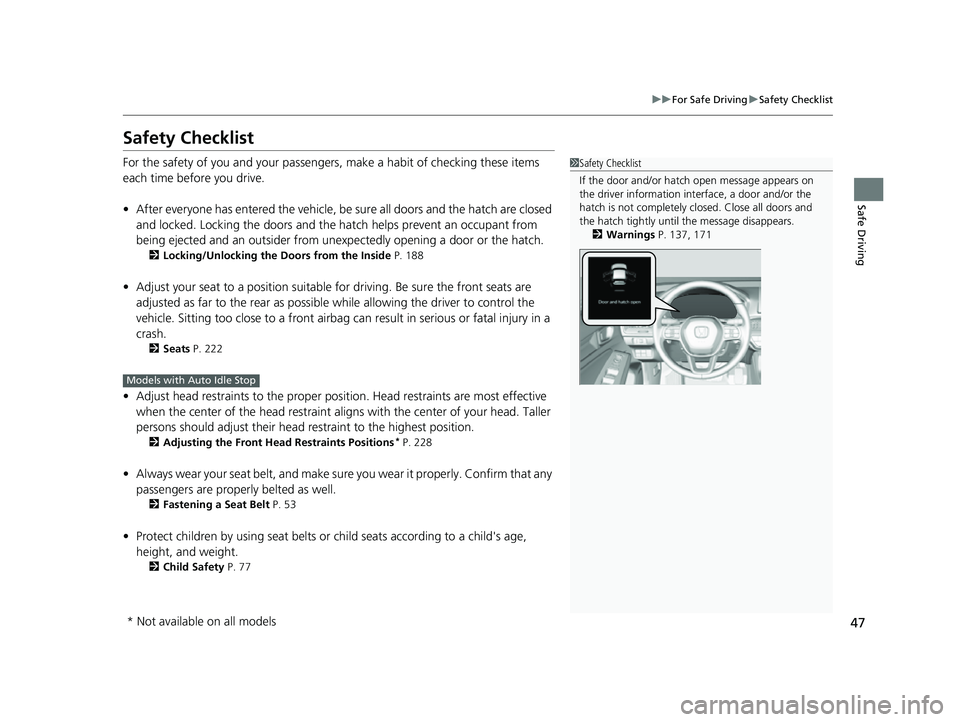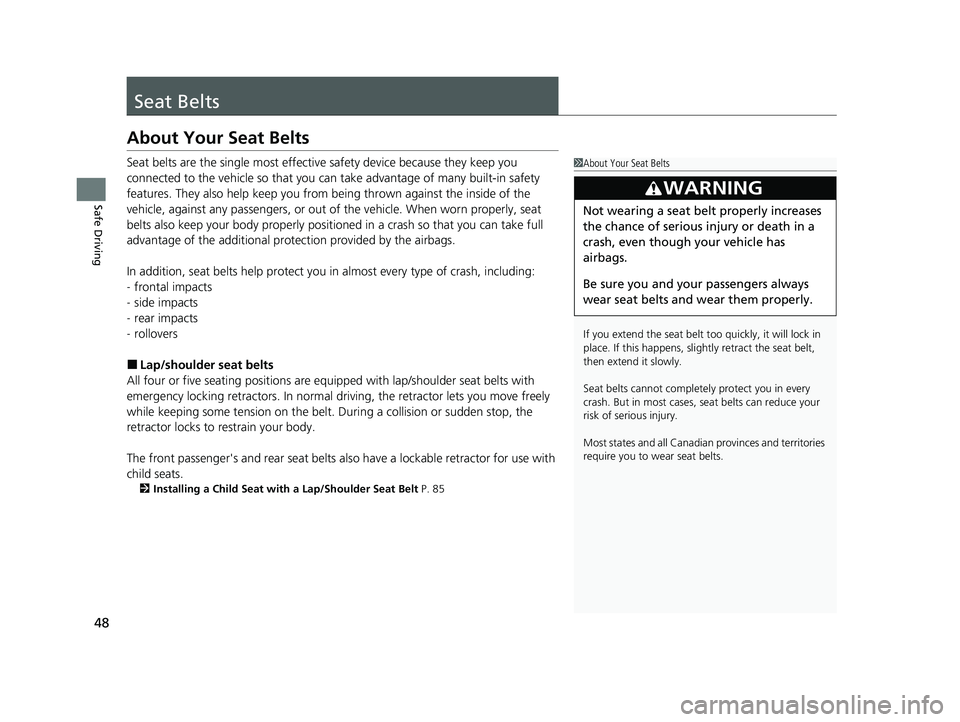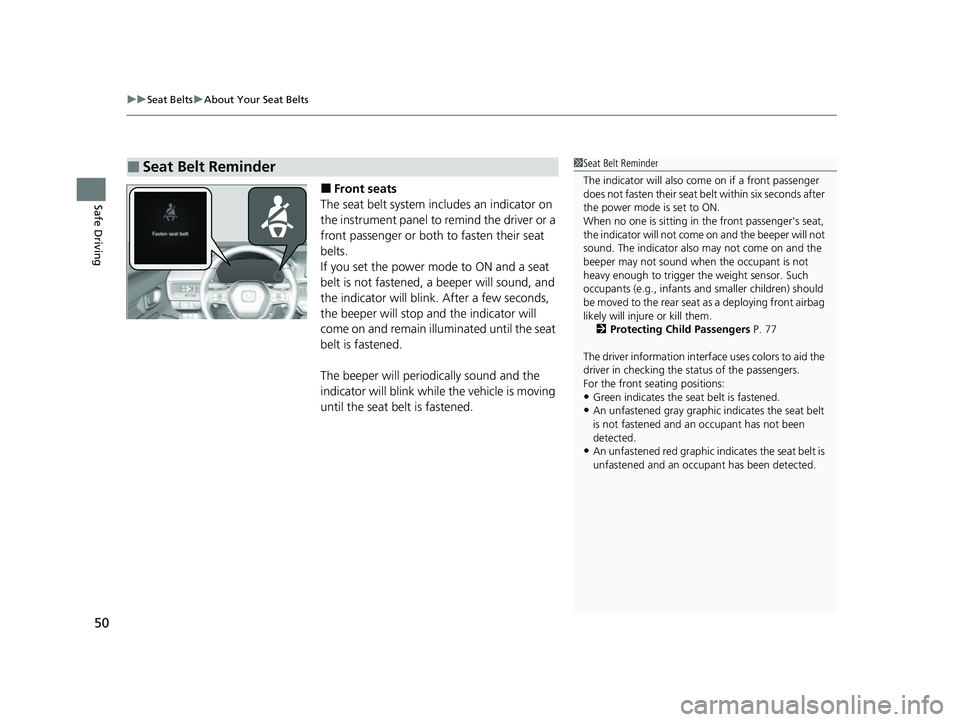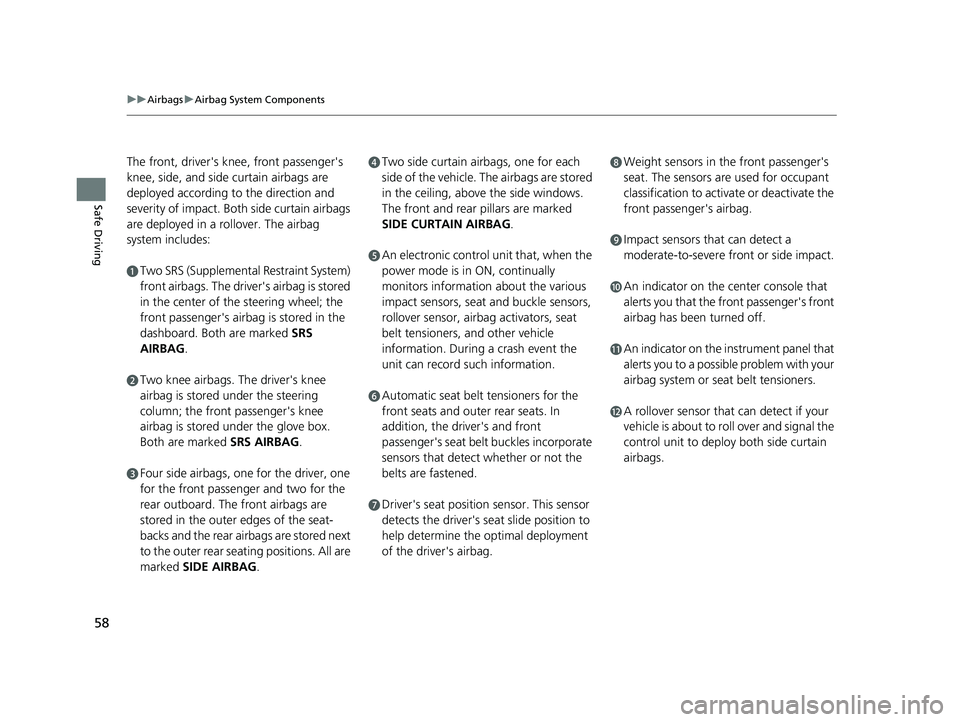Page 48 of 840

46
uuFor Safe Driving uYour Vehicle's Safety Features
Safe Driving
Your Vehicle's Safety Features
The following checklist will help you take an active role in protecting yourself and
your passengers.
1 Your Vehicle's Safety Features
Your vehicle is equipped wi th many features that
work together to help protect you and your
passengers during a crash.
Some features do not require any action on your part.
These include a strong steel framework that forms a
safety cage around the passenger compartment,
front and rear crush zones, a collapsi ble steering
column, and tensioners th at tighten the front and
rear outer seat belts in a sufficient crash.
However, you and your passe ngers cannot take full
advantage of these features unless you remain seated
in the correct position and always wear your seat
belts. In fact, some safety features can contribute to
injuries if they are not used properly.
67891011
Safety Cage
Crush Zones
Seats and Seat-Backs
Head Restraints
Collapsible Steering Column
Seat Belts
Front Airbags
Side Curtain Airbags
Door Locks Side Airbags
Seat Belt Tensioners7
79
9
8
10
6
11
Outer Lap Pretensioners Knee Airbags12
13
10
12
13
9
11
12
8
23 CIVIC HATCHBACK TYPE R-31T406100_03.book 46 ページ 2022年6月23日 木曜日 午後9時28分
Page 49 of 840

47
uuFor Safe Driving uSafety Checklist
Safe Driving
Safety Checklist
For the safety of you and your passengers, make a habit of checking these items
each time before you drive.
• After everyone has entered the vehicle, be sure all doors and the hatch are closed
and locked. Locking the doors and the hatch helps prevent an occupant from
being ejected and an outsider from unexpectedly opening a door or the hatch.
2 Locking/Unlocking the Doors from the Inside P. 188
•Adjust your seat to a position suitable for driving. Be sure the front seats are
adjusted as far to the rear as possible while allowing the driver to control the
vehicle. Sitting too close to a front airbag can result in serious or fatal injury in a
crash.
2 Seats P. 222
•Adjust head restraints to the proper position. Head restraints are most effective
when the center of the head restraint alig ns with the center of your head. Taller
persons should adjust their head restraint to the highest position.
2 Adjusting the Front Head Restraints Positions* P. 228
•Always wear your seat belt, and make sure you wear it properly. Confirm that any
passengers are properly belted as well.
2 Fastening a Seat Belt P. 53
•Protect children by using seat belts or child seats according to a child's age,
height, and weight.
2 Child Safety P. 77
1Safety Checklist
If the door and/or hatch open message appears on
the driver information inte rface, a door and/or the
hatch is not completely cl osed. Close all doors and
the hatch tightly until the message disappears.
2 Warnings P. 137, 171
Models with Auto Idle Stop
* Not available on all models
23 CIVIC HATCHBACK TYPE R-31T406100_03.book 47 ページ 2022年6月23日 木曜日 午後9時28分
Page 50 of 840

48
Safe Driving
Seat Belts
About Your Seat Belts
Seat belts are the single most effective safety device because they keep you
connected to the vehicle so that you can take advantage of many built-in safety
features. They also help keep you from being thrown against the inside of the
vehicle, against any passenger s, or out of the vehicle. When worn properly, seat
belts also keep your body properly positi oned in a crash so that you can take full
advantage of the additional prot ection provided by the airbags.
In addition, seat belts help protect you in almost every type of crash, including:
- frontal impacts
- side impacts
- rear impacts
- rollovers
■Lap/shoulder seat belts
All four or five seating positions are equipped with lap/shoulder seat belts with
emergency locking retractors. In normal driv ing, the retractor lets you move freely
while keeping some tension on the belt. During a collision or sudden stop, the
retractor locks to restrain your body.
The front passenger's and rear seat belts al so have a lockable retractor for use with
child seats.
2 Installing a Child Seat with a Lap/Shoulder Seat Belt P. 85
1About Your Seat Belts
If you extend the seat belt t oo quickly, it will lock in
place. If this happens, sli ghtly retract the seat belt,
then extend it slowly.
Seat belts cannot complete ly protect you in every
crash. But in most cases, seat belts can reduce your
risk of serious injury.
Most states and all Canadian provinces and territories
require you to wear seat belts.
3WARNING
Not wearing a seat belt properly increases
the chance of serious injury or death in a
crash, even though your vehicle has
airbags.
Be sure you and your passengers always
wear seat belts and wear them properly.
23 CIVIC HATCHBACK TYPE R-31T406100_03.book 48 ページ 2022年6月23日 木曜日 午後9時28分
Page 52 of 840

uuSeat Belts uAbout Your Seat Belts
50
Safe Driving■Front seats
The seat belt system in cludes an indicator on
the instrument panel to remind the driver or a
front passenger or both to fasten their seat
belts.
If you set the power mode to ON and a seat
belt is not fastened, a beeper will sound, and
the indicator will blink. After a few seconds,
the beeper will stop and the indicator will
come on and remain illuminated until the seat
belt is fastened.
The beeper will periodically sound and the
indicator will blink while the vehicle is moving
until the seat belt is fastened.
■Seat Belt Reminder1 Seat Belt Reminder
The indicator will also co me on if a front passenger
does not fasten their seat be lt within six seconds after
the power mode is set to ON.
When no one is sitting in th e front passenger's seat,
the indicator will not come on and the beeper will not
sound. The indicator also may not come on and the
beeper may not sound when the occupant is not
heavy enough to trigger th e weight sensor. Such
occupants (e.g., infants and smaller children) should
be moved to the rear seat as a deploying front airbag
likely will injure or kill them.
2 Protecting Child Passengers P. 77
The driver information interface uses colors to aid the
driver in checking the st atus of the passengers.
For the front seating positions:
•Green indicates the seat belt is fastened.
•An unfastened gray graphic indicates the seat belt
is not fastened and an occupant has not been
detected.
•An unfastened red graphic i ndicates the seat belt is
unfastened and an occupa nt has been detected.
23 CIVIC HATCHBACK TYPE R-31T406100_03.book 50 ページ 2022年6月23日 木曜日 午後9時28分
Page 54 of 840
uuSeat Belts uAbout Your Seat Belts
52
Safe DrivingThe front seats and the outer rear seats are equipped with automatic seat belt
tensioners to enhance safety.
The tensioners automatically tighten the front seat belts and the outer rear seat belts
during a moderate-to-severe frontal collision, sometimes even if the collision is not
severe enough to inflate the front airbags or the front knee airbags.
■Automatic Seat Belt Tensioners1Automatic Seat Belt Tensioners
The seat belt tensioners can only operate once.
If a tensioner is activated, the SRS indicator will come
on. Have a dealer replace the tensioner and
thoroughly inspect the seat belt system as it may not
offer protection in a subsequent crash.
During a moderate-to-severe side impact, the
tensioner on both sides of th e vehicle also activates.
Front seats
Outer rear seats
23 CIVIC HATCHBACK TYPE R-31T406100_03.book 52 ページ 2022年6月23日 木曜日 午後9時28分
Page 57 of 840
55
uuSeat Belts uFastening a Seat Belt
Safe DrivingIf you are pregnant, the best way to prot ect yourself and your unborn child when
driving or riding in a vehicle is to always wear a seat belt and keep the lap part of the
belt as low as possible across the hips.
■Advice for Pregnant Women1 Advice for Pregnant Women
Each time you have a checkup, ask your doctor if it is
okay for you to drive.
To reduce the risk of inju ries to both you and your
unborn child that can be caus ed by an inflating front
airbag:
•When driving, sit upright a nd adjust the seat as far
back as possible while allowing full control of the
vehicle.
•When sitting in the front passenger's seat, adjust
the seat as far back as possible.
Wear the shoulder belt
across the chest avoiding
the abdomen.
Wear the lap part of the
belt as low as possible
across the hips.
23 CIVIC HATCHBACK TYPE R-31T406100_03.book 55 ページ 2022年6月23日 木曜日 午後9時28分
Page 59 of 840
57Continued
Safe Driving
Airbags
Airbag System Components
6
7
8
9
1011
12
69
6
9
6
9
99
23 CIVIC HATCHBACK TYPE R-31T406100_03.book 57 ページ 2022年6月23日 木曜日 午後9時28分
Page 60 of 840

58
uuAirbags uAirbag System Components
Safe Driving
The front, driver's knee, front passenger's
knee, side, and side curtain airbags are
deployed according to the direction and
severity of impact. Both side curtain airbags
are deployed in a ro llover. The airbag
system includes:
aTwo SRS (Supplemental Restraint System)
front airbags. The driver's airbag is stored
in the center of the steering wheel; the
front passenger's airbag is stored in the
dashboard. Both are marked SRS
AIRBAG.
bTwo knee airbags. Th e driver's knee
airbag is stored under the steering
column; the front passenger's knee
airbag is stored under the glove box.
Both are marked SRS AIRBAG.
cFour side airbags, one for the driver, one
for the front passenger and two for the
rear outboard. The front airbags are
stored in the outer edges of the seat-
backs and the rear airbags are stored next
to the outer rear seating positions. All are
marked SIDE AIRBAG .
dTwo side curtain airbags, one for each
side of the vehicle. The airbags are stored
in the ceiling, above the side windows.
The front and rear pillars are marked
SIDE CURTAIN AIRBAG .
eAn electronic control unit that, when the
power mode is in ON, continually
monitors information about the various
impact sensors, seat and buckle sensors,
rollover sensor, airbag activators, seat
belt tensioners, and other vehicle
information. During a crash event the
unit can record such information.
fAutomatic seat belt tensioners for the
front seats and outer rear seats. In
addition, the driver's and front
passenger's seat belt buckles incorporate
sensors that detect whether or not the
belts are fastened.
gDriver's seat position sensor. This sensor
detects the driver's seat slide position to
help determine the optimal deployment
of the driver's airbag.
hWeight sensors in the front passenger's
seat. The sensors are used for occupant
classification to activa te or deactivate the
front passenger's airbag.
iImpact sensors that can detect a
moderate-to-severe front or side impact.
jAn indicator on the center console that
alerts you that the front passenger's front
airbag has been turned off.
kAn indicator on the instrument panel that
alerts you to a possib le problem with your
airbag system or seat belt tensioners.
lA rollover sensor that can detect if your
vehicle is about to roll over and signal the
control unit to deploy both side curtain
airbags.
23 CIVIC HATCHBACK TYPE R-31T406100_03.book 58 ページ 2022年6月23日 木曜日 午後9時28分